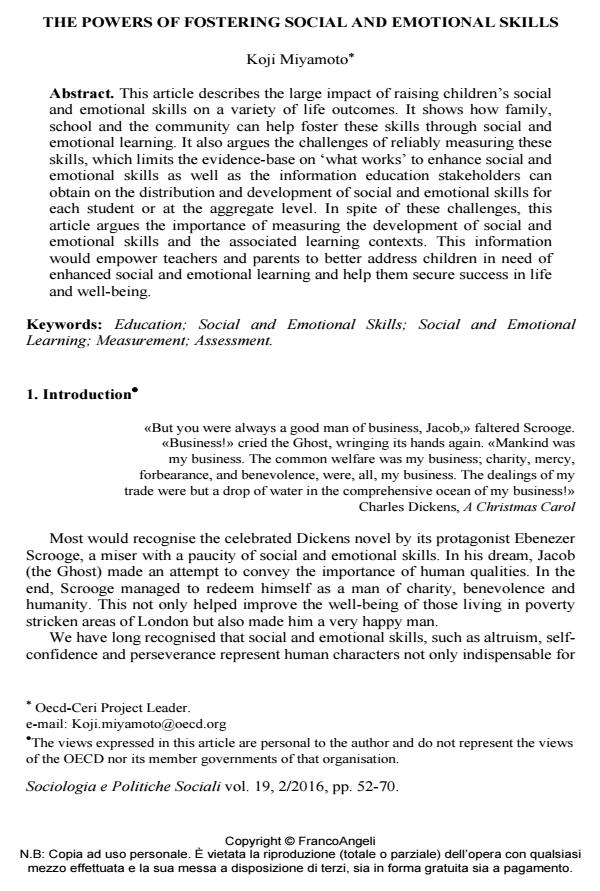The powers of fostering social and emotional skills
Titolo Rivista SOCIOLOGIA E POLITICHE SOCIALI
Autori/Curatori Koji Miyamoto
Anno di pubblicazione 2016 Fascicolo 2016/2 Lingua Inglese
Numero pagine 19 P. 52-70 Dimensione file 321 KB
DOI 10.3280/SP2016-002004
Il DOI è il codice a barre della proprietà intellettuale: per saperne di più
clicca qui
Qui sotto puoi vedere in anteprima la prima pagina di questo articolo.
Se questo articolo ti interessa, lo puoi acquistare (e scaricare in formato pdf) seguendo le facili indicazioni per acquistare il download credit. Acquista Download Credits per scaricare questo Articolo in formato PDF

FrancoAngeli è membro della Publishers International Linking Association, Inc (PILA)associazione indipendente e non profit per facilitare (attraverso i servizi tecnologici implementati da CrossRef.org) l’accesso degli studiosi ai contenuti digitali nelle pubblicazioni professionali e scientifiche
This article describes the large impact of raising children’s social and emotional skills on a variety of life outcomes. It shows how family, school and the community can help foster these skills through social and emotional learning. It also argues the challenges of reliably measuring these skills, which limits the evidence-base on ‘what works’ to enhance social and emotional skills as well as the information education stakeholders can obtain on the distribution and development of social and emotional skills for each student or at the aggregate level. In spite of these challenges, this article argues the importance of measuring the development of social and emotional skills and the associated learning contexts. This information would empower teachers and parents to better address children in need of enhanced social and emotional learning and help them secure success in life and well-being.
Keywords:Education; Social and Emotional Skills; Social and Emotional Learning; Measurement; Assessment.
- Cedefop (European Centre for the Development of Vocational Training), 2008. Terminology of European Education and Training Policy: A Selection of 100 Key Terms, Office for Official Publications of the European Community, Luxembourg.
- Dickens, C. 1872. A Christmas Carol. London.
- Heckman, J.J. 2007. The economics, technology and neuroscience of human capability formation. Proceedings of the National Academy of Sciences of the United States of America, (104)33, pp. 13250-13255.
- Heckman, J.J., Stixrud, J. and Urzua, S. 2006. The Effects of Cognitive and Noncognitive Abilities on Labor Market Outcomes and Social Behavior. Journal of Labor Economics, 24(3), pp. 411-482.
- Ikesako, H. and Miyamoto, K. 2015. Fostering social and emotional skills through families, schools and communities: Summary of international evidence and implication for Japan’s educational practices and research. OECD Education Working Papers, No. 121. Paris: Oecd Publishing. DOI: 10.1787/5js07529lwf0-en
- John, O.P. and De Fruyt, F. 2015. Education and Social Progress, Framework for the Longitudinal Study of Social and Emotional Skills in Cities. Paris: Oecd Publishing.
- John, O. P. and Srivastava, S. 1999. The Big-Five trait taxonomy: History, measurement, and theoretical perspectives. In L.A. Pervin and O.P. John eds. Handbook of personality: Theory and research, Vol. 2, pp. 102-138. New York: Guilford Press.
- Kautz, T. et al. 2014. Fostering and Measuring Skills: Improving Cognitive and Non-cognitive Skills to Promote Lifetime Success. OECD Education Working Papers, No. 110. Paris: Oecd Publishing. DOI: 10.1787/5jxsr7vr78f7-en
- King, G. and Wand, J. 2007. Comparing incomparable survey responses: New tools for anchoring vignettes. Oxford Journals, Political Analysis, pp. 15, 46 66. Oxford: Oxford University Press.
- Kyllonen, P.C. (forthcoming). Socio-emotional and self-management variables in learning and assessment. In A. Rupp and J. Leighton eds. Handbook of Cognition and Assessment. New York: Wiley/Blackwell.
- Kyllonen, P.C. 2016. Designing tests to measure personal attributes and non cognitive skills, in S. Lane, M. Raymond, and T.M. Haladyna eds. Handbook of Test Development, 2nd edition, pp. 190-211. London and New York: Routledge.
- Kyllonen, P.C. 2014. Non-cognitive skills assessment can be improved with innovative new measures. Paper presented at Researchers’ Forum: Measuring Skills that Matter. In High Level Policy Forum (Skills for Social Progress), www.oecd.org/site/espforum2014/, Sao Paolo, Brazil.
- Oecd. 2015. Skills for Social Progress: The Power of Social and Emotional Skills, OECD Skills Studies. Paris: Oecd Publishing. DOI: 10.1787/9789264226159-en
- Reynolds, A.J. 2000. Success in Early Intervention: The Chicago Child-Parent Centers. Lincoln: University of Nebraska Press.
- Shaw, D.S. 2014. Parenting programs and their impact on the social and emotional development of young children, 2nd ed. Encyclopedia on Early Childhood Development.http://www.childencyclopedia.com/sites/default/files/textesexperts/en/654/parenting-programs-and-their-impact-onthe-social-and-emotional-development-of-young-children.pdf (accessed on 10 January 2015).
- Tierney, J.P., Baldwin-Grossman, J. and Resch, N.L. 1995. Making a difference: An impact study of Big Brothers Big Sisters. Public/Private Ventures.
- Whetzel, D.L., and McDaniel, M.A. 2009. Situational Judgment Tests: An Overview of Current Research. Human Resource Management Review, 19(3), pp. 188-202.
- Werquin, P. 2010. Recognising Non-Formal and Informal Learning: Outcomes, Policies and Practices. Paris: Oecd Publishing.
Koji Miyamoto, The powers of fostering social and emotional skills in "SOCIOLOGIA E POLITICHE SOCIALI" 2/2016, pp 52-70, DOI: 10.3280/SP2016-002004